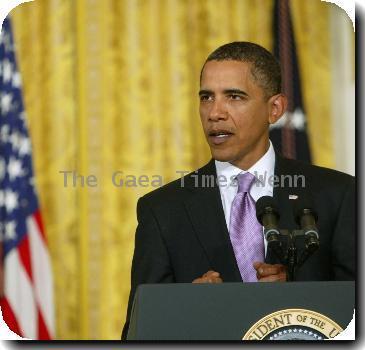Education Department: Delaware, Tenn. get $600M in 1st round of ‘Race to the Top’ grants
By Dorie Turner, APMonday, March 29, 2010
Feds pick Delaware, Tenn. for $600M ed grants
ATLANTA — Federal officials on Monday awarded Tennessee and Delaware $600 million in grants to improve failing schools, sending a message to other states hoping to win money: revamp your education laws and get your districts and teachers to sign off.
They are the first two states to win the highly competitive “Race to the Top” grants, a $4.35 billion Obama administration program meant to encourage innovative programs to boost student achievement. Tennessee is getting $500 million and Delaware will receive $100 million.
Both states were lauded for their merit pay policies that link teacher pay to student performance and their charter school laws that are welcoming to the nontraditional education models.
But they also were winners because they had every school district approve their applications, which meant that their reforms could touch every student rather than be limited to a handful of districts.
“They have demonstrated the courage, capacity and commitment to turn their ideas into practices that can improve outcomes for students,” Education Secretary Arne Duncan said. Tennessee and Delaware “will blaze a path for the future of education reform.”
The states also got buy-in from nearly all of their teachers’ unions and from every school district, a move that helped them stand out from the other 14 finalists for the unprecedented grant program.
The third- and fourth-place finishers — Georgia and Florida — both had opposition from some of their largest teachers groups.
Both the Georgia Association of Educators and the Florida Education Association released statements calling for their state leaders to get teacher input before reapplying for the next round of grants. The winners of that round will be announced in the fall.
“Labor-management collaboration and cooperation is a key ingredient,” said Randi Weingarten, president of the American Federation of Teachers, a Washington, D.C.,-based group that represents 1.4 million educators in 43 states.
Forty states and Washington, D.C., applied for the grant program, and 16 finalists were named this month. Any state can apply for the second round of grants, with applications due in June.
Leaders in many of the states that didn’t win Monday have vowed to strengthen their applications and try again.
“Georgia will reapply in June and we will be tough to beat in the second round,” Georgia Gov. Sonny Perdue said.
Leaders in both Tennessee and Delaware said the grant money will help them improve high school graduation rates, raise student achievement and turn around struggling schools.
“This really is going to be a watershed moment for education in our state,” Tennessee Gov. Phil Bredesen said.
Tennessee lawmakers passed a new law during a special session in January that requires student achievement data to comprise half of each teacher’s evaluation, a key reform pushed by the Obama administration.
Lawmakers also lifted the state’s cap on the number of charter schools that can open each year and set up a statewide school district specifically for failing schools. They also got the state’s teachers and school districts to sign off on the plan.
In Delaware, school districts and teachers approved the application, which highlighted the state’s new law allowing educators to be removed from the classroom if they are rated “ineffective” for two to three years.
The state offers financial incentives to top-notch educators willing to work in failing schools and in high-demand subjects. It will also hire coaches to meet with small groups of teachers several times a month to develop lesson plans based on student test data.
Delaware Gov. Jack Markell later received a congratulory phone call from Vice President Joe Biden.
“This is not about the money — it’s about putting our children first,” Markell said.
The winners beat out: Colorado, the District of Columbia, Florida, Georgia, Illinois, Kentucky, Louisiana, Massachusetts, New York, North Carolina, Ohio, Pennsylvania, Rhode Island and South Carolina.
The grant program is part of President Barack Obama’s economic stimulus law, which provided $100 billion for schools.
Federal officials asked states to focus their proposals on four areas: adopting standards and assessments to better prepare students for careers and college; getting high-quality teachers; turning around low-performing schools; and creating data systems to track performance.
Some education observers have criticized the competition, saying the administration is out of touch because it is pushing reform at a time when states can barely afford basic necessities and are laying off teachers by the hundreds.
Applications were read and scored by panels of five peer reviewers. The 16 with the highest average score visited Washington this month to present their proposals.
“A lot of people said ‘They’re going to end up giving it to lots of states’ and ‘the federal government can never really be selective.’ It turns out they actually were,” said Kati Haycock, president of The Education Trust, a nonpartisan Washington, D.C.-based think tank.
“They’re setting the bar this high that only two states met it, it sends a very powerful message,” Haycock said.
Associated Press writers Erik Schelzig in Nashville, Tenn., Christine Armario in Miami, Michelle R. Smith in Providence, R.I. and Randall Chase in Dover, Del., contributed to this report.
Tags: Atlanta, Barack Obama, Chase, Delaware, District Of Columbia, Education Policy, Florida, Georgia, Labor Issues, North America, Ohio, Primary And Secondary Education, Rhode Island, Teaching, Tennessee, United States





